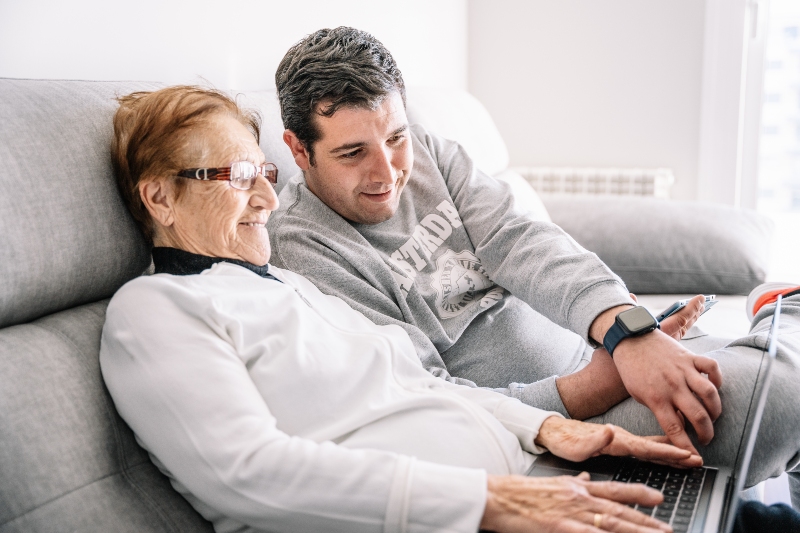Understanding Facebook after death legacy contact options can prevent family’s loss of precious digital memories.
Sarah’s dad passed away suddenly, leaving behind 12 years of Facebook memories. When she tried to access his account, Facebook’s response surprised her: “We can either memorialize the account or delete it.”
When someone dies, Facebook doesn’t automatically grant family access to their account. Instead, the platform offers two very different paths – and the choice you make (or don’t make) determines whether those memories are preserved, who can see them, and what happens to years of digital history.
Most families discover these options during grief, when making complex decisions feels overwhelming. Here’s what you need to know about Facebook’s policies and how to set things up properly before a crisis hits.
What Happens to Facebook Accounts When Someone Dies?
According to Facebook’s official help documentation, families must proactively set up Legacy Contact features.
Without Preparation:
- Facebook may eventually detect the death through obituary crawling or user reports
- The account might be automatically memorialized (frozen in its current state)
- Family members cannot access messages, photos, or account settings
- All privacy settings remain as they were – private content stays private forever
The Reality Check: Facebook has no obligation to help families access accounts, even with death certificates. Your parent’s privacy settings become permanent, and private memories may be lost forever.
Legacy Contact vs Memorial Account: The Critical Difference
Facebook Legacy Contact (Set Up BEFORE Death)
A Legacy Contact is someone your parent designates while they’re alive to manage certain aspects of their Facebook account after death.
What a Legacy Contact CAN Do:
- Accept new friend requests (from people who want to share memories)
- Update profile and cover photos
- Write a pinned post (like a memorial message)
- Respond to new friend requests
- Download a copy of what your parent shared (posts, photos, profile info)
What a Legacy Contact CANNOT Do:
- Read private messages
- Log into the account
- See anything your parent didn’t share publicly or with friends
- Remove or edit existing posts
- Access Facebook Messenger conversations
The Download Feature: This is huge. Legacy contacts can download an archive of your parent’s Facebook activity – posts, photos they shared, their friend list, and pages they liked. This creates a permanent backup of their digital memories.
Memorial Account (After Death, Family Requests)
A Memorialized Account is what happens when Facebook converts a deceased person’s profile into a memorial page.
How Memorial Accounts Work:
- The word “Remembering” appears next to your parent’s name
- Friends can share memories on the timeline
- The account shows up in Facebook’s safety check during disasters or events
- All privacy settings remain exactly as they were when your parent was alive
- No one can log into the account, ever
What Family Members CAN Do:
- Request memorialization (with death certificate)
- Report the account if they want it deleted instead
- View whatever was already visible to them based on privacy settings
What Family Members CANNOT Do:
- Access private messages or photos
- Change privacy settings to see more content
- Download content unless they were designated as Legacy Contact
- Add new photos or update information

The Conversation Your Parent Needs to Have
Most parents don’t realize they need to actively set up Legacy Contact – it’s not automatic. Here’s how to approach this topic:
Start With Memories, Not Death: “Dad, you have 15 years of family photos on Facebook that we’d hate to lose. Facebook has a feature that lets you choose someone to help preserve those memories. It takes five minutes to set up – want me to show you how?”
Address Privacy Concerns: “You stay in complete control. The Legacy Contact can’t see your private messages or anything you didn’t already share with friends. They can just help preserve the memories you did share and respond if people want to share condolences.”
Make It About Family Photos: “Think about all those pictures from [specific memory] – we’d love to make sure the grandkids can always see those. This just gives us a way to download those photos if something happens to your account.”
Emphasize It’s Reversible: “You can change who your Legacy Contact is anytime, or remove it completely. You’re just giving someone permission to help preserve your memories.”
How to Set Up Facebook Legacy Contact
Step 1: Access Settings
- Go to Settings & Privacy > Settings
- Select “Security” in the left menu
- Click “Legacy Contact”
Step 2: Choose Your Person
- Select someone who is already your Facebook friend
- Choose someone tech-comfortable who will outlive you
- Consider picking someone who appears in your photos frequently
Step 3: Decide About Downloads
- Check the box to allow your Legacy Contact to download your information
- This includes posts, photos, profile information, and friend list
- Does NOT include private messages
Step 4: Send the Message Facebook will notify your chosen person and explain their role.
Common Mistakes Families Make
Waiting for a Medical Crisis By the time someone is in hospice or ICU, they may not be able to clearly consent to adding a Legacy Contact. Set this up during healthy times.
Assuming Spouses Have Automatic Access Marriage doesn’t grant Facebook access. Spouses need to be explicitly designated as Legacy Contacts.
Not Downloading Content Regularly Even with Legacy Contact set up, consider downloading important photos while your parent is alive and can help identify people and occasions.
Forgetting Other Meta Properties Facebook Legacy Contact doesn’t automatically cover Instagram or WhatsApp. These need separate planning.
What About Instagram and WhatsApp?
Instagram: Has a similar memorial process but no Legacy Contact feature. Accounts can be memorialized or deleted, but family cannot access content.
WhatsApp: Messages are device-specific and encrypted. When someone dies, their WhatsApp conversations are generally lost unless backed up to cloud storage (which requires knowing their phone passcode).
Cross-Platform Reality: Your parent’s Meta/Facebook login might be used for other websites and services. Legacy Contact doesn’t provide access to those accounts.
Beyond Facebook: The Bigger Picture
Facebook Legacy Contact is an excellent start, but it’s just one piece of comprehensive digital planning. Your parent likely has photos, messages, and memories scattered across:
- Google Photos (different legacy system)
- Apple iCloud (requires Digital Legacy Contact)
- Email accounts (various policies)
- Text messages on their phone
- Other social media platforms
The Smart Approach: Address Facebook Legacy Contact as part of a broader conversation about preserving digital memories and organizing online accounts.
Script for Reluctant Parents
If your parent resists: “I understand this feels morbid. But right now, if something happened to your Facebook account – if it got hacked or if Facebook made an error – all those family photos could disappear. This just gives us a backup plan for your memories. You don’t lose any control or privacy.”
Alternative approach: “Let’s start with just downloading some of your favorite photo albums to keep safe copies. Then if you’re comfortable, we can set up the Legacy Contact as an extra backup.”
Your Action Steps
- Have the conversation using the memory-focused script above
- Set up Legacy Contact together – don’t do this without them present
- Consider downloading key photos while they can help you identify people and occasions
- Document the process in your family’s digital organization system
- Plan for Instagram and other platforms separately
For comprehensive digital legacy planning: Visit DigitalLegacyKit.com for step-by-step guides covering all major platforms, family conversation scripts, and coordination tools. Facebook is just the beginning of protecting your family’s digital memories.
Don’t wait for a crisis to discover that Facebook’s policies don’t align with your family’s needs. Fifteen minutes of conversation today can preserve decades of digital memories tomorrow.
Facebook’s policies and features change regularly. This information was current as of 2025 – always verify current procedures at facebook.com/help. The Digital Legacy Kit provides updated guides for all major platforms and comprehensive family coordination tools.



